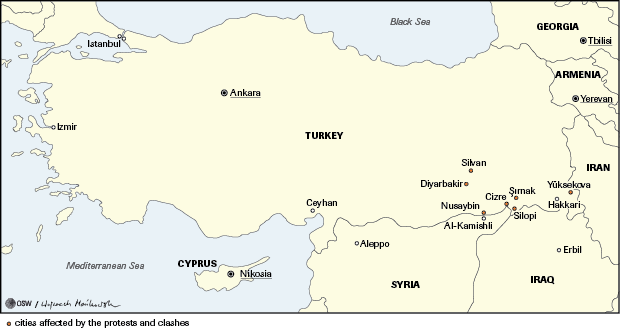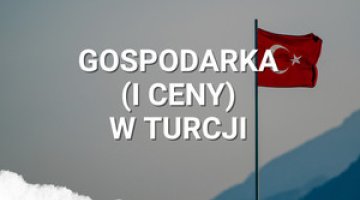Turkey’s internal front: the conflict with the Kurds escalates
Neither the political stabilisation since the November election nor winter, which used to be an extinguishing factor in the past, have been able to halt the Turkish-Kurdish conflict which was unfrozen in July this year. At least 214 militants and around 100 civilians were reportedly killed in battles already since mid-December. According to extreme estimates, there are around 200,000 internal refugees in the country. In the territories affected by the fighting, there have been declarations of allegiance to the government being ended and attempts to build alternative structures have been observed – informal ‘people’s assemblies’ and city mayors announced local autonomies inspired by the Kurdish rebels. Furthermore, an extraordinary meeting of the Democratic Society Congress, an organisation which unites radical Kurdish activists linked to the Kurdistan Workers’ Party (PKK) and the pro-Kurdish parliamentary People’s Democratic Party (HDP) was held at the end of December. The Congress directly questioned the unity of the Turkish state and demanded broad autonomy for areas with a Kurdish majority population. Both sides have radicalised their stances at the present stage; HDP’s political demands have become very similar to those of PKK, and the government is responding to this with force. This makes a political compromise less likely. The conflict is also adversely affecting Turkey’s ability to carry out its interests in regional policy (in Syria and Iraq) – because Ankara is busy dealing with internal tension, which raises concerns of the West co-operating with Turkey, for example, on the migration issue.
The military dimension of the Turkish-Kurdish conflict
The present stage of the conflict between Turkish government forces and PKK and its youth organisation, the Patriotic Revolutionary Youth Movement (YDG-H), began in July this year. The bomb attack in Suruc provided the impulse for the clashes. Then, in an atmosphere of post-election political crisis and the related Turkish-Kurdish tension, PKK accused the government of co-operating with Islamic State and broke the ceasefire which had been in place since 2013. The government, in turn, launched an anti-terrorist campaign mainly against Kurdish rebels.
Since that time, the Turkish army, alongside other law enforcement agencies, has conducted regular operations aimed at defeating PKK and liquidating its units in Turkey and Iraq. The Turkish army has launched air raids on the militants’ bases in the Qandil Mountains in Iraq, and has been engaged in regular combat in eastern Anatolia. Between the end of July and 15 December, a curfew was announced on 62 occasions in the cities covered by the anti-terrorist operation. The police, gendarmerie and army troops using heavy equipment are engaged in the operations. A blockade is introduced in the city or part thereof where the curfew applies, and the government forces embark upon pacification.
In turn, PKK is active in the field, attacking police, gendarmerie and border guard posts and is also engaged in fights with government troops. City guerrilla units consisting of PKK and YDG-H militants operate in urban areas. These are engaged in regular fights with government troops, and are also committing acts of terrorism against the local population. Thus the conflict which until recently was manifested mainly in the mountains has extended to cities inhabited by the Kurdish population. This both escalates it and leads to a dramatic deterioration of the civilian population’s situation since they are forced to leave their homes. Finally, it is radicalising Kurds, who used to support the HDP, which until recently was a moderate party.
According to calculations made by the International Crisis Group, between the resumption of the fighting in July and 15 December, the conflict claimed the lives of 194 people on the Turkish side, and at least 221 Kurdish militants and 151 civilians. In turn, the conflict has been seriously escalated as a consequence of the government troops’ offensive launched in mid December mainly in Cizre, Silopi, Nusaybin and Sırnak, and also in one part of Diyarbakir. The Turkish side claims that as many as 214 militants have been killed during this operation alone. In turn, Human Rights Watch reports that the clashes have claimed the lives of over 100 civilians. In addition to this, the number of internal refugees fleeing to central and western Turkey, according to the highest estimates, may reach as many as 200,000 people.
The political radicalisation of the Kurds
In parallel to the escalation of the military conflict, the political representation of the Kurds continues to be radicalised. HDP, which entered the parliament winning over 5 million votes, already before the election announced the need to return to political talks between Kurds and the government. Its stance has recently shifted closer and closer towards the circles linked to PKK, who are demanding that the government should recognise the right of the regions inhabited by Kurds to enjoy extensive autonomy.
It was worth noting that HDP’s leader, Selahattin Demirtas was present during the meetings of the informal Democratic Society Congress, a political platform which groups together activists and small Kurdish parties, on 26-27 December. Unofficially, the force behind the congress is the Group of Communities in Kurdistan (KCK), which is considered to be the socio-political wing of PKK. The congress has demanded a radical autonomisation and decentralisation of the political order in Turkey as a whole. In demanding a reform of the constitutional order and contesting the unitary nature of the Republic of Turkey, Kurdish activists have drawn upon the views of the imprisoned leader of PKK, Abdullah Ocalan. Kurdish activists believe that the militants’ struggle is legitimate.
Demirtas’s declarations concerning the demanded autonomy and, in the long term, the independence of Kurdistan are proof of a serious radicalisation of the Kurdish parliamentary representation and have provoked a sharp reaction from President Recep Tayyip Erdogan, who quoted article 14 of the constitution, which provides for the penalisation of any attempts to question the unitary nature of the Turkish state. An investigation has been launched against Demirtas himself in connection with this (in the past politicians and entire parties were imprisoned on these grounds). These moves have been backed by the vast majority of the Turkish public who are attached to the republican model of their state.
The stance of those in favour of Kurdish autonomy moves in line with local politicians’ moves. In the cities which are currently affected by the fighting most of all, i.e. Cizre, Silopi and Nusaybin, and Sırnak province, self-governance has been announced by the ‘people’s assemblies’ which emerged via inspiration from PKK. City mayors have become engaged in the operation of these informal structures alternative to the Turkish state, as a consequence of which some local politicians have been arrested by Turkish security services.
Relations between Kurdish politicians and the government were also aggravated due to Demirtas’s visit to Moscow on 23 December. During his meeting with the Russian minister of foreign affairs Sergey Lavrov, he openly criticised Turkey for shooting down the Russian Su-24 aircraft. This in turn provoked a sharp reaction from the Turkish government. Prime Minister Ahmet Davutoglu, who had planned talks on the constitutional reforms with representatives of all the parliamentary political parties, cancelled the meeting with the leaders of HDP. Furthermore, the government has accused the party of supporting terrorists and has rejected its demands for autonomy, thus ruling out the possibility of conducting talks.
The consequences
The escalation of the Turkish-Kurdish conflict on both the military and socio-political levels is bringing about a situation in which the government’s authority is illusory in numerous places in southern Turkey. Neither the Kurdish side nor the government have demonstrated any readiness for political compromise. The situation in south-eastern Turkey has thus taken on the form of a creeping civil war. At present there is hardly any chance that it will be snuffed out.
The conflict with Kurds will seriously affect Turkey’s regional policy. It can be stoked not only by PKK from Syria and Iraq, but also by Turkey’s regional rivals (Syria, Iran and Russia). The present situation is also negatively affecting Turkey’s political activity in Iraq and Syria, and exposes Ankara to the risk of criticism from the West. European countries expect that Turkey and the Syrian Kurds will be their allies in the struggle against Islamic State and that Turkey will also help resolve the migration crisis. Meanwhile, the Turkish-Kurdish tension poses the threat that a new wave of refugees, this time Turkish citizens, will come to the EU.
Map
The Turkish-Kurdish conflict since July 2015






